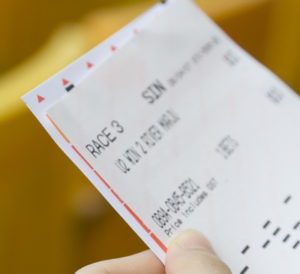 If you’re visiting this site and reading this page, there is a good chance that you have either placed a bet in the past or else are considering doing so in the future. We all have our own reasons for gambling, but there are also a few main themes behind the decisions that people make to place a bet or visit a casino. Whether you’re purely in it to try and win money, feel like you have to place wagers thanks to societal pressure or are doing it because you’re superstitious and feel as though you have to, you’ll have a reason.
If you’re visiting this site and reading this page, there is a good chance that you have either placed a bet in the past or else are considering doing so in the future. We all have our own reasons for gambling, but there are also a few main themes behind the decisions that people make to place a bet or visit a casino. Whether you’re purely in it to try and win money, feel like you have to place wagers thanks to societal pressure or are doing it because you’re superstitious and feel as though you have to, you’ll have a reason.
In simple terms, the ultimate purpose of gambling is to try to win money. You put your own money at risk in the hope that you’ll be able to win some money back from bookmakers or casinos. Yet when you move away from such a simplistic way of thinking, you’ll discover that there are all sorts of reasons why someone might choose to place a bet. The ‘purpose’ of gambling will differ from person to person, coming down to a series of choices that are based around the specific situation that each finds themselves in when they make the choice.
Many of the reasons why people gamble discussed on this page can be very harmful to some. Our aim is to look at why people gamble and not offer any potential reasons as to why you should gamble. Gambling is simply taking risks with your money and the clear majority of gamblers will lose over time. Whether you gamble to try to win, for enjoyment or through social pressure you should only ever bet what you can afford to lose and never bet on anything you don’t understand.
Winning Money
 There is only one place to start when it comes to looking at the specific reasons why someone might choose to gamble. Ultimately, betting is an activity that involves putting your own money on the line in the hope that you win more than you started with, but in most cases increase it significantly. Regardless of the manner in which you gamble and the activity that you choose to involve yourself in, you are looking to see your own pot of money increase. That is always the case, regardless of any other outside factors.
There is only one place to start when it comes to looking at the specific reasons why someone might choose to gamble. Ultimately, betting is an activity that involves putting your own money on the line in the hope that you win more than you started with, but in most cases increase it significantly. Regardless of the manner in which you gamble and the activity that you choose to involve yourself in, you are looking to see your own pot of money increase. That is always the case, regardless of any other outside factors.
That is to say, you might gamble because you have felt a pressure to do so from your peers, for example, but you’ll still be hoping to win. Though there is some evidence to suggest that the very act of betting causes people to trigger the same sort of enjoyment in their brains as winning a bet, it is extremely rare for anyone to actively hope that they are going to lose their bet. As a result, virtually everyone that chooses to gamble will be doing so in order to win money, either in a small sense or in a much bigger one, situation dependent.
We will come on to discuss the reasons people might want to make money shortly, given that they can be their own reason behind the choice to gamble. Here, though, we are considering the likelihood of someone placing a bet purely for the purpose of winning money. Many bettors hope that they will be able to turn a small stake into a large amount of winnings, so they aim to win as much money as they can and gamble simply in the hope that they will be able to turn a profit. Winning money is the base reason almost everyone gambles.
Never is this clearer than when huge swathes of people choose to buy tickets for the National Lottery or the EuroMillions when there have been a series of rollovers. Even those that usually don’t gamble will be at least mildly tempted to engage in the process when there’s something like £140 million on the line. Even the likes of £5 or £6 million will be life-changing for most people, so the notion that you gamble for money is a relatively easy one to understand when the amount of money we’re talking about is extraordinary. The lottery is a good example because the actual value is terrible but people are so taken by the size of the top prize that they don’t consider it.
Winning bets and winning money overall can also be different things. A lot of people gamble on relatively safe outcomes, such as strong favourites, with a preference for likely outcomes. This means they win a lot of bets but because favourites tend to be poorly priced it means they actually lose money in the long term. Some people enjoy winning bets but give little consideration as to whether they are winning back enough to cover their loses.
Enjoyment
 The next obvious reason why people bet is that they enjoy it. Whilst some people can get caught up in this and go too far with it, for many, the simple fact is that they have a good time when they’re placing bets. The act of betting is an enjoyable thing in and of itself, irrespective of whether or not they actually win their wagers. Imagine playing roulette, for example. The moment that the croupier lets go of the ball and sends it on its journey around the wheel, all outcomes are possible and just as likely as each other.
The next obvious reason why people bet is that they enjoy it. Whilst some people can get caught up in this and go too far with it, for many, the simple fact is that they have a good time when they’re placing bets. The act of betting is an enjoyable thing in and of itself, irrespective of whether or not they actually win their wagers. Imagine playing roulette, for example. The moment that the croupier lets go of the ball and sends it on its journey around the wheel, all outcomes are possible and just as likely as each other.
Someone that has bet £100 on the number 17 stands to win £3,500 if it lands, presuming that they are playing on a European roulette table. Include their £100 stake back and that means that they could potentially walk away with £3,600. For some punters, that possibility is intoxicating, meaning that they get a thrill simply out of watching the ball spin and knowing that the might end up with significantly more money than they originally bet if the ball lands on the right number. That is the experience with roulette, but each game boasts its own variation.
For that reason, there are plenty of people that place bets for the thrill of doing so as much as for the chance of winning their wagers. They get a sense of enjoyment out of betting that they only get in rare other aspects of their life, so that is why they choose to gamble. This intoxication can be extremely dangerous, of course, leading to some people developing problems with gambling. It is why betting sites are forced to downplay the idea of betting being something fun and full of enjoyment, because, for many, it isn’t.
Engagement With What You’re Betting On
 There is no question that some punters decide to gamble because it gives them a greater sense of engagement with the thing that they are betting on. Whilst this is going to be less common for people that regularly attend casinos, for sports bettors this is an experience that they will recognise in themselves. Sitting down to watch a sport that they don’t enjoy, such as cricket or rugby, some punters will choose to place a bet because it will mean that they are more invested in what is taking place in front of them, willing their bet to win.
There is no question that some punters decide to gamble because it gives them a greater sense of engagement with the thing that they are betting on. Whilst this is going to be less common for people that regularly attend casinos, for sports bettors this is an experience that they will recognise in themselves. Sitting down to watch a sport that they don’t enjoy, such as cricket or rugby, some punters will choose to place a bet because it will mean that they are more invested in what is taking place in front of them, willing their bet to win.
For a time, a well known betting site with the slogan ‘It matters more when there’s money on it.’ The idea behind the slogan being that you will be even more invested in something if you stand to win some money should the result go your way. There are a host of bettors that will choose to gamble for exactly this reason, feeling as though their enjoyment of an event can only be enhanced by putting their own money at risk. This is always mistaken thinking, of course, not least because you should never bet on something you don’t understand.
Fitting In / Peer Pressure
 Regardless of how old we are, we’ve all felt pressure to join in with others when they’ve been doing something. Have you ever been out with a group of mates who are all drinking and so you’ve downed a beer, done a shot or ordered a short simple because you wanted to fit in? That is the perfect example of feeling peer pressured into doing something, even though we don’t really want to do it. A night out with friends or work colleagues that takes you to a casino can put you in a position where you feel like you have to bet, even if you don’t want to.
Regardless of how old we are, we’ve all felt pressure to join in with others when they’ve been doing something. Have you ever been out with a group of mates who are all drinking and so you’ve downed a beer, done a shot or ordered a short simple because you wanted to fit in? That is the perfect example of feeling peer pressured into doing something, even though we don’t really want to do it. A night out with friends or work colleagues that takes you to a casino can put you in a position where you feel like you have to bet, even if you don’t want to.
In the modern era, of course, most people are more aware of how such a trip can make someone feel, but that doesn’t mean that they never happen. Whether you’re watching football with a group of friends who are all placing bets or someone has stopped into a betting shop on the way to a night out, there are all sorts of situations that might arise that will put you in a situation where you feel as if you have to gamble or else will be judged. These are difficult situations to get out of, but are another reason why some gamble.
Financial Pressures
 We have already covered the idea of gambling to win money, but for some it isn’t just a desire but can be a desperate need. At the time of the writing, the United Kingdom is in a situation where the cost of living has gone up to such an extent that some people are having to choose between putting on their heating and being able to eat food. Those that are in a situation of poverty might only have £1 left, but choosing between buying a couple of tins of beans to eat and purchasing a scratch card is a choice that they think might change their situation.
We have already covered the idea of gambling to win money, but for some it isn’t just a desire but can be a desperate need. At the time of the writing, the United Kingdom is in a situation where the cost of living has gone up to such an extent that some people are having to choose between putting on their heating and being able to eat food. Those that are in a situation of poverty might only have £1 left, but choosing between buying a couple of tins of beans to eat and purchasing a scratch card is a choice that they think might change their situation.
For most of us, we might want to win money to change our lives, but we don’t need to do it just so that we can eat some lunch without feeling panicked that we’ll freeze to death. Those that aren’t as fortunate will feel a financial pressure to gamble for that reason, whilst others might feel the same pressure just because they owe someone money or they need to pay off some debt. Whatever the reason, there is no doubt that financial pressures can drive people to gamble even if they can’t really afford to lose, despite that being the most likely outcome.
Escapism
 There is certainly evidence out there that suggests that people gamble from time to time in order to escape from the reality of their lives. Whether we have worries or stresses or just don’t like the situations that we find ourselves in, the idea of turning to gambling as a way of focusing on something else can be too much to ignore. It isn’t the right thing to do, but given the manner in which so many of us can feel trapped or lost in our lives, it is something that we choose to do for the purposes of pure escapism.
There is certainly evidence out there that suggests that people gamble from time to time in order to escape from the reality of their lives. Whether we have worries or stresses or just don’t like the situations that we find ourselves in, the idea of turning to gambling as a way of focusing on something else can be too much to ignore. It isn’t the right thing to do, but given the manner in which so many of us can feel trapped or lost in our lives, it is something that we choose to do for the purposes of pure escapism.
If you aren’t sure how true this is, consider why some slot games have storylines attached. In essence, all a slot machine needs to do is spin the reels and tell you whether you’ve won your bet or not. Yet the vast majority of them have storylines attached that allow people to escape into an entirely different world. They are often silly and don’t make sense, but their very existence is enough to draw people and keep them engaged in the games that they’re playing for long enough for them to escape their reality.
There is also the fact that casinos do not have windows or clocks. This is obvious to stop people from realising how long they’ve been betting for, but that alone can be used as proof for how distracting gambling can be. If you can be in a situation where you don’t know how long you’ve been doing something for, the truth is that it is obviously an engaging activity; for better or for worse. Gambling to escape isn’t a healthy approach to the world of betting, but it is one that plenty of people nevertheless opt for sometimes.
Superstition
 For a lot of gamblers, their superstitions cannot be separated from their betting experiences. More than that, though, there are some punters who choose to gamble because they are superstitious. Imagine a football fan who placed a bet once and saw the team that they support pick up a win. They will then associated this bet with their team’s success, ignoring the fact that they can have no power over the outcome of a football match. The problem is, they’re now stuck in a pattern where they have to bet every time.
For a lot of gamblers, their superstitions cannot be separated from their betting experiences. More than that, though, there are some punters who choose to gamble because they are superstitious. Imagine a football fan who placed a bet once and saw the team that they support pick up a win. They will then associated this bet with their team’s success, ignoring the fact that they can have no power over the outcome of a football match. The problem is, they’re now stuck in a pattern where they have to bet every time.
The nature of superstitious is such that the person concerned won’t consider the fact that their team didn’t win because their betting on the result makes no difference. Instead, they must have placed the wrong bet or gone about the actual physical placing of the wager in the wrong manner. Whilst this is a specific example, there will be plenty of others involving people who get caught up in superstitions when walking through a casino or visiting a race track. Whatever the reason, being caught up in superstitions is something you’ll struggle to break out of.
